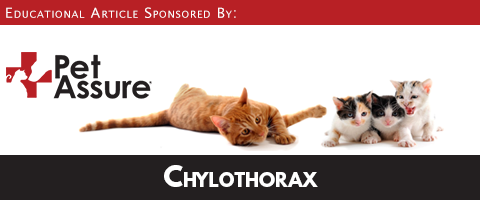Normally, there is a little bit of clear liquid in the pleural cavity (space between the lungs and chest wall). This makes sure that the lungs do not stick to the wall.
Chylothorax is a rare condition when there is too much liquid in the cavity. This can be fatal, as the lungs cannot expand fully.
There are two possible scenarios:
- Pleural effusion: fluid invades the cavity, restricts lung expansion, and makes it difficult to breathe
- Milky white fluid containing fat replaces the clear fluid in the cavity: more dangerous because the liquid is thicker and breathing is even more difficult
Both scenarios are emergencies, leading to respiratory failure and death.
CAUSES:
More than half of chylothorax cases are idiopathic (the cause is unknown).
Some possible causes include:
- Tumors
- Heartworms
- Heart disease, blood clots, high blood pressure
- Trauma to the chest: falls, car accidents
SIGNS:
Typical signs include:
- Difficulty breathing (your catmay look like it’s holding its breath)
- Coughing (not natural in cats)
Other possible signs include:
- Depression, lack of energy
- Loss of appetite
- Blue skin because of the lack of oxygen
If your cat has any trouble breathing, go to the veterinarian immediately.
DIAGNOSIS:
In order to diagnose your cat with chylothorax, your veterinarian may perform the following:
- Physical examination: specifically listening to the chest with a stethoscope
- Chest x-ray
- Chest tap: fluid is removed and studied
Additional tests to determine the underlying cause may include:
- Ultrasound of the heart
- Abdominal x-rays
- Blood tests
- Testing the fluid for bacteria
TREATMENT:
Most veterinarians will recommend the following treatments for cats with chylothorax:
- Stabilizing breathing: fluid is drained
- Treating the underlying disorder
- Feeding a low fat diet
- Rutin: a supplement that stimulates the cells which carry away the fat that’s in the liquid
PREVENTION:
In many cats, the underlying cause of chylothorax is never determined, and therefore, cannot be prevented.
Chylothorax can occur as a symptom of heart failure caused by heartworm disease. Discuss heartworm prevention with your veterinarian.
PROGNOSIS:
There is a good prognosis with treatment to stabilize breathing and for any underlying conditions.
Since the excess liquid irritates the heart and lungs, scar tissue may form. It will press on the lungs, causing breathing difficulty and long-term damage. Therefore, you must go to the veterinarian as soon as you notice signs.



